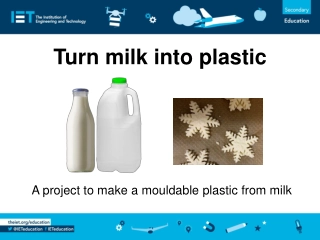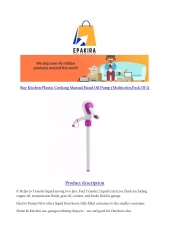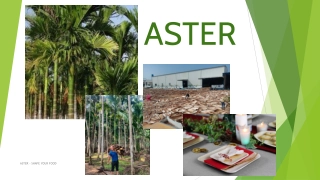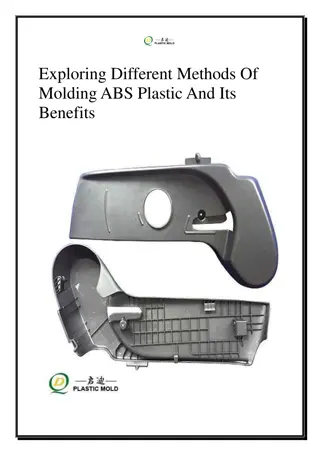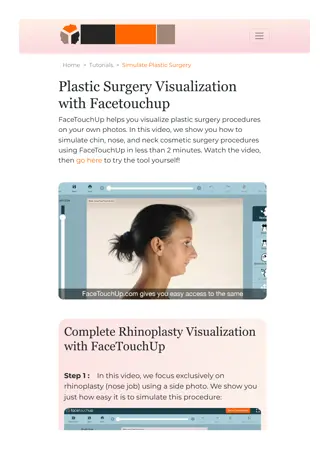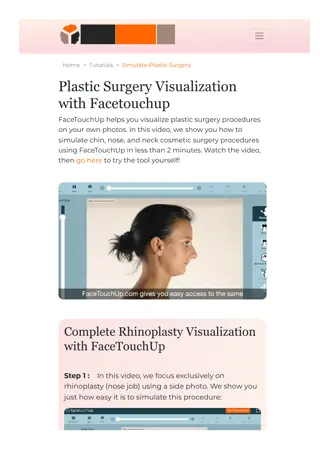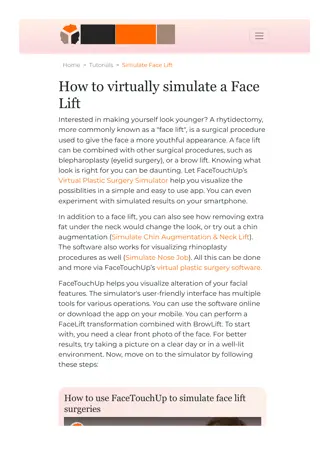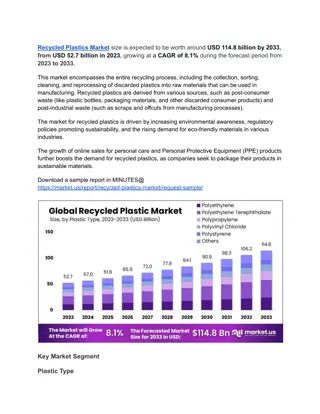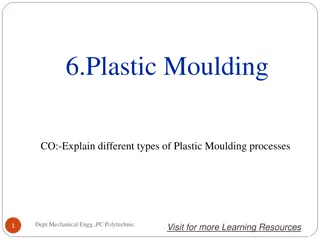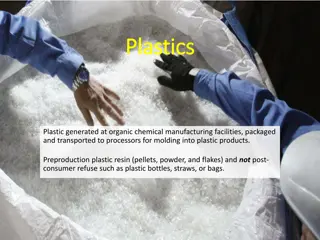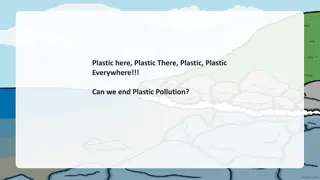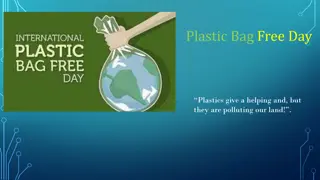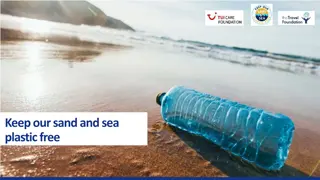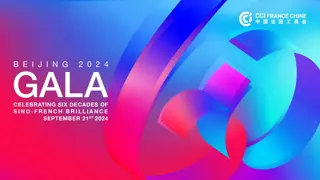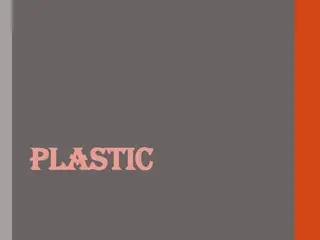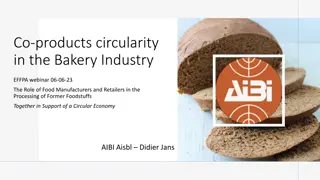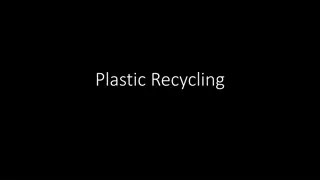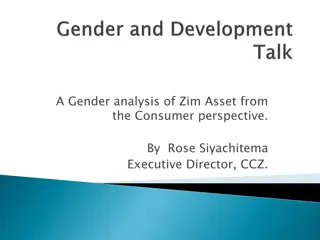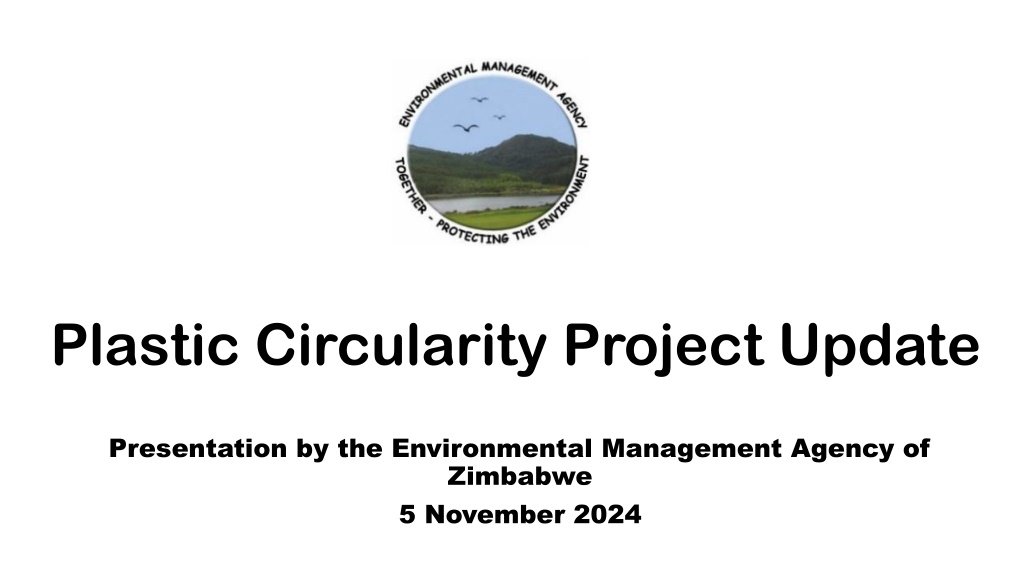
Advancing Circular Economy Solutions in Zimbabwe
Learn about the Environmental Management Agency of Zimbabwe's plastic circularity project update, aimed at reducing plastic pollution and promoting a clean, safe environment. Explore the challenges of plastic waste management in Zimbabwe and the impact of plastic waste on the environment. Discover how the project objectives and activities are contributing to a sustainable future for Zimbabwe.
Download Presentation

Please find below an Image/Link to download the presentation.
The content on the website is provided AS IS for your information and personal use only. It may not be sold, licensed, or shared on other websites without obtaining consent from the author. If you encounter any issues during the download, it is possible that the publisher has removed the file from their server.
You are allowed to download the files provided on this website for personal or commercial use, subject to the condition that they are used lawfully. All files are the property of their respective owners.
The content on the website is provided AS IS for your information and personal use only. It may not be sold, licensed, or shared on other websites without obtaining consent from the author.
E N D
Presentation Transcript
Plastic Circularity Project Update Presentation by the Environmental Management Agency of Zimbabwe 5 November 2024
Presentation Outline Background of Environmental Management Agency Plastic Waste in Zimbabwe Project Over View Project Objectives Project Activities and Update Project Activities
EMA Background The Environmental Management Agency is a statutory organisation, established in terms of the Environmental Management Act, Chapter 20:27 It falls under the Ministry of Environment, Climate and Wildlife It was established to ensure a clean, safe and healthy environment as provided by section 73 of the Constitution of Zimbabwe
Plastic Waste in Zimbabwe Zimbabwe is generates approximately 1,9million tonnes of refuse annually; Plastic waste alone amounts to approximately 342,000 tonnes per annum (18% of the total MSW generation) Zimbabwe s current solid waste generation rate is high compared to the computed mean for Africa which is estimated to be 0.65 kg per capita per day (World Bank,2014).
Plastic Waste generation Plastic Waste generation Zimbabwe imports over 10,000 tonnes of plastics annually and generates a wide range of plastic wastes including Low density polyethylene (LDPE) High density polyethylene (HDPE) Polyethylene Terephthalate Poly vinyl chloride (PVC) Polystyrene Polypropylene
Impact of plastic waste situation Plastics have been a source of air pollution in Zimbabwe. . Non collection of waste results in rampant burning of dumpsites a phenomenon which has contributed to the release of dangerous gases such as dioxins and furans and other greenhouse gases into the atmosphere. Plastic waste has contributed to widespread littering in towns, cities and along highways. Municipal waste disposal sites in Zimbabwe are heavily choked with various sorts of plastic waste a clear manifestation that the plastic waste takes time to be degraded by natural processes thereby lasting long in the environment.
Project Overview Project Overview Project Title Advancing Circular Economy Solutions: A Collaborative Approach to Reducing Plastic Pollution in Zimbabwe Project Tenure August 2024-January 2025 Grant Value USD110,000.00
Project Objectives The objective of this project is to facilitate the transitioning to a circular economy for plastics in Zimbabwe by: 1. Quantifying microplastic pollution levels in the Zambezi River basin arising from Zimbabwe's plastic pollution. 2. Updating plastics flow inventoryin Zimbabwe and identify plastics leakage hotspots. 3. Identifying incentives for recycling,reuse,and decoupling in large value chains in Zimbabwe 4. Developing draft guidelines for plastics recycling and reuse as well as a roadmap for Extended Producer Responsibilityscheme in Zimbabwe.
Project Activities and Update Project Activities and update Activity 1 Stakeholder Engagement and Sensitization A two-day workshop was conducted from the 12thto the 13thof September 2024 at Monomotapa Hotel in Harare. The workshop attracted sixty-eight (68) participants from the private sector, government institutions, industry, the media, and representatives from UNEP. The validation workshop was done to obtain insights and opinions of key stakeholders for input on the final report.
Project Activities Activity 2 Quantify microplastic pollution levels in the Zambezi River basin arising from Zimbabwe's plastic pollution An online training was conducted on the sampling and analysis methods to be used for the water in Manyame River and analyzing the microplastics. A group of around 30 people, composed of stakeholders from 9 different organisations were trained. The Country is now in the process of purchasing the suitable nets (Plankton Nets) for the sampling of the water.
Project Activities Project Activities Activity 3 Update plastics flow inventory in Zimbabwe and identify plastics leakage hotspots. A meeting was held on the 9thof October 2024 and came up with the below workplan and assessments are being done on plastic pollution hotspots. Workplan hotspots meeting Deliverables Plastic flow inventory assessment, researching existing policies, and identifying plastic pollution Delivery Date 1 November 2024 Plastic flow inventory assessment and researching existing policies Developing hotspot intervention areas meeting 18 November 2024 October 30, 2024. Report production and recommendations meeting 2 December 2024 Identify plastic pollution hotspots November 10, 2024. Developing hotspot intervention plans November 15, 2024 Report production and recommendations November 29, 2024.
Project Activities Activity 4 Assessments to identify incentives for recycling, reuse and decoupling in large value chains in Zimbabwe. Main Activity Cost-Benefit Analyses in 3 Large Plastic Value Chains (1) Sub-Activity Timeline 27 Oct 01 Nov Responsible EMA, CoH, ZSG, BCSDZ, CUT Select target value chains in Zimbabwe. Identify material types used within those value chains. 27 Oct 01 Nov EMA, CoH, ZSG, BCSDZ, CUT Development of 5 questionnaires 27 Oct 01 Nov EMA, CoH, ZSG, BCSDZ, CUT Collect quantitative data on material costs, waste management costs, revenue from recycling/reuse, and environmental costs. (Harare, Gweru, Bulawayo, Beitbridge, Masvingo, Mutare) Conduct cost-benefit analyses for each material type. 04-15 Nov EMA, CoH, ZSG, BCSDZ, CUT Document and report findings, including key opportunities and economic viability. 25-29 Nov EMA, CoH, ZSG, BCSDZ, CUT Evaluation of studies on Existing Infrastructure MRFs (2) Conduct a literature review of existing assessments and studies on MRFs in Zimbabwe. 04-15 Nov EMA, CoH, ZSG, BCSDZ, CUT Engage stakeholders through interviews to gather insights on current practices. 27 Oct 01 Nov EMA, CoH, ZSG, BCSDZ, CUT (Harare, Gweru, Bulawayo, Beitbridge, Masvingo, Mutare)
Activity 4 continued Map existing recycling infrastructure (MRFs and composting facilities). 27 Oct 01 Nov EMA, CoH, ZSG, BCSDZ, CUT Perform a gap analysis to quantify infrastructure deficiencies and investment opportunities. 04-15 Nov EMA, CoH, ZSG, BCSDZ, CUT Provide development. recommendations for infrastructure 18-22 Nov EMA, CoH, ZSG, BCSDZ, CUT Development of Case Studies of packaging in Zimbabwe that have been successfully decoupled from virgin plastic / finite fossil resources (3) Select decoupledfrom virgin plastics. successful case studies of packaging 27 Oct 01 Nov EMA, CoH, ZSG, BCSDZ, CUT Gather stakeholders. data through interviews with critical 27 Oct 01 Nov EMA, CoH, ZSG, BCSDZ, CUT (Harare, Gweru, Bulawayo, Beitbridge, Masvingo, Mutare) Develop a consistent template for documenting each case study. 18-22 Nov EMA, CoH, ZSG, BCSDZ, CUT Analyze findings to identify common success factors and scaling or investmentopportunities. 18-22 Nov EMA, CoH, ZSG, BCSDZ, CUT Compile case studies in a report or presentation format. 25-29 Nov EMA, CoH, ZSG, BCSDZ, CUT
Project Activities Activity 5 Develop draft guidelines for plastics recycling and reuse as well as a roadmap for the Extended Producer Responsibility scheme in Zimbabwe.Stakeholders met and produce the below workplan Activity Due Date Working group engagement and feedback meetings fortnightly 1October to 31 January 2024 Stakeholders Consultations 20 October -20 November 2024 Draft roadmap to Extended Producer Responsibility 30 November 2024 Communication Strategy to raise awareness 30 December 2024
Thank you Thank you

